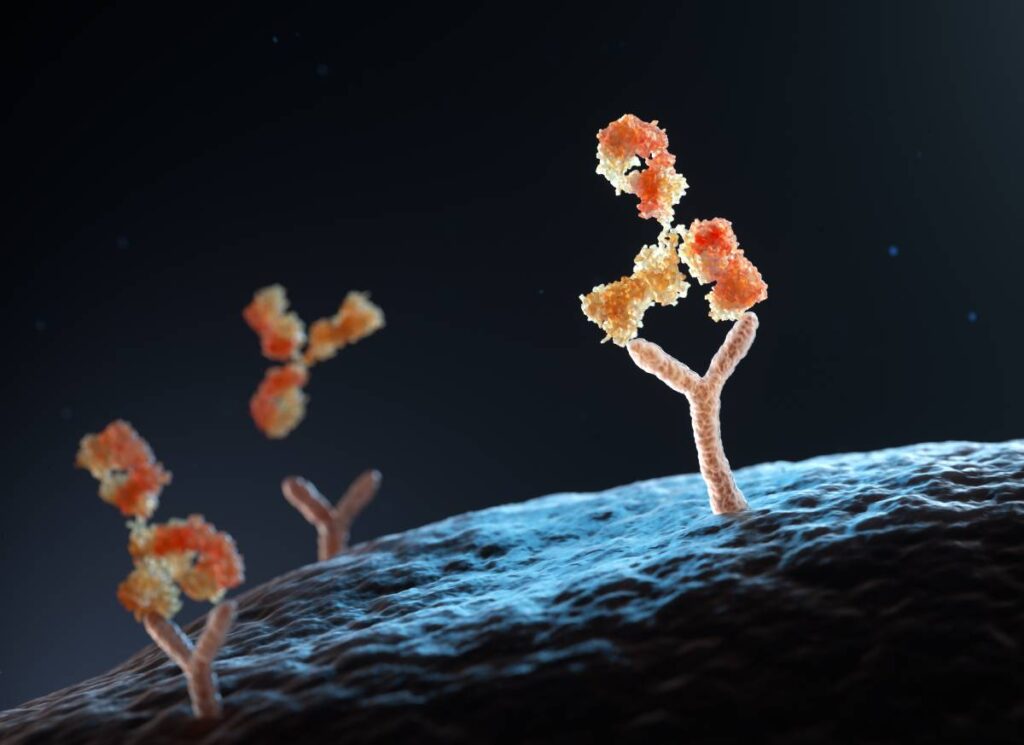Since early 2020, the covid pandemic has resulted in hundreds of millions of cases and several million deaths worldwide. The development of COVID-19 vaccines was effective in reducing mortality rates, but they have had suboptimal efficacy in immunocompromised patients, thus leaving a portion of individuals at high risk of infection 1. However, the use of monoclonal antibodies, in addition to vaccination, can better protect vulnerable and immunocompromised populations 2. In particular, one avenue being explored is the use of monoclonal antibody treatment as prophylaxis for immunocompromised patients – meaning that patients receive monoclonal antibodies after exposure and before measurable infection.
Data support the use of monoclonal antibodies to treat infected patients at a high risk of progression to severe COVID-19. Randomized clinical trials have shown that these can reach 70-80% efficacy in reducing hospitalizations and death rates in high-risk patients 3.
However, a number of barriers have slowed down their use and widespread clinical implementation. These include their cost and the narrow timeframe within which they can exert their strongest effect. A solution to these challenges is to administer monoclonal antibody treatment to vulnerable people, such as immunocompromised people, as post- or even pre-COVID-19 exposure prophylaxis.
A randomized controlled trial demonstrated that the subcutaneous infusion of casirivimab/imdevimab within 96 hours of confirmed exposure resulted, as compared to a placebo, in a relative risk reduction of nearly 93% of developing symptomatic disease. Participants in this study were household contacts of people who tested positive for COVID-19 within 96 hours beforehand 4. In a similar vein, another study showed that bamlanivimab administration as post-exposure prophylaxis to the residents and staff of U.S.-based nursing and assisted living facilities with at least one confirmed COVID-19 case, as compared to a placebo, lowered the risk of developing mild or severe disease 5. Preliminary results from ongoing studies have corroborated these positive results 2.
Emergency use authorization has been granted to several monoclonal antibody formulations for treatment and post-exposure prophylaxis in select individuals at high risk for severe COVID-19 disease, such as immunocompromised people 6.
Most recently, the Food and Drug Administration (FDA) issued an emergency use authorization for AstraZeneca’s Evusheld™ (tixagevimab and cilgavimab) as pre-exposure prophylaxis. This drug consists of a combination of two monoclonal antibodies and is given in two consecutive injections in the arm over the course of one visit 7. Adult and pediatric patients (over 12 years of age and 88 pounds) neither infected with or recently exposed to COVID-19 and who are moderately or severely immunocompromised are eligible under the EUA. Moderately to severely immunocompromised patients include but are not limited to patients receiving active chemotherapy for any solid tumor malignancy, patients with a hematological malignancy, and patients having received a solid organ transplant on immunosuppressants 8. Due to the limited supply of these monoclonal antibodies, however, patients will be prioritized based on their risk of severe disease and likelihood to respond adequately to the vaccine.
The treatment’s minimum effective concentration, as well as the optimal interval between doses, has yet to be elucidated. A comparative analysis of the efficacy of the different available monoclonal antibody treatments has also yet to be carried out.
It is important to note that the upfront cost of monoclonal antibodies may be out of reach in low-income countries. Specific aid programs may be required to cover the treatment expense and ensure swift access to care 2.
Although several studies have proven the efficacy of monoclonal antibodies for the treatment and prophylaxis of COVID-19 infection, robust, real-world data on their efficacy and safety for pre- and postexposure prophylaxis are still warranted. Additional research is required in order to elucidate the impact in particular of monoclonal antibody prophylaxis in immunocompromised patients.
References
- Lee, A. R. Y. Bin et al. Efficacy of covid-19 vaccines in immunocompromised patients: systematic review and meta-analysis. BMJ (2022). doi:10.1136/bmj-2021-068632
- Gentile, I. & Moriello, N. S. COVID-19 prophylaxis in immunosuppressed patients: Beyond vaccination. PLoS Med. 19, (2022). doi: 10.1371/journal.pmed.1003917.
- Siemieniuk, R. A. C. et al. Antibody and cellular therapies for treatment of covid-19: A living systematic review and network meta-analysis. The BMJ (2021). doi:10.1136/bmj.n2231
- O’Brien, M. P. et al. Subcutaneous REGEN-COV Antibody Combination to Prevent Covid-19. N. Engl. J. Med. (2021). doi:10.1056/nejmoa2109682
- Cohen, M. S. et al. Effect of Bamlanivimab vs Placebo on Incidence of COVID-19 among Residents and Staff of Skilled Nursing and Assisted Living Facilities: A Randomized Clinical Trial. JAMA – J. Am. Med. Assoc. (2021). doi:10.1001/jama.2021.8828
- Criteria for monoclonal antibodies COVID-19 – UpToDate. Available at: https://www.uptodate.com/contents/image/print?imageKey=PC%2F131725. (Accessed: 8th November 2022)
- Pre-exposure Prophylaxis with Evusheld. Available at: https://www.cdc.gov/coronavirus/2019-ncov/hcp/clinical-care/pre-exposure-prophylaxis.html. (Accessed: 8th November 2022)
- Pre-Exposure Prophylaxis for Immunocompromised Patients | UPMC. Available at: https://www.upmc.com/coronavirus/monoclonal-antibodies/immunocompromised-patients. (Accessed: 8th November 2022)



